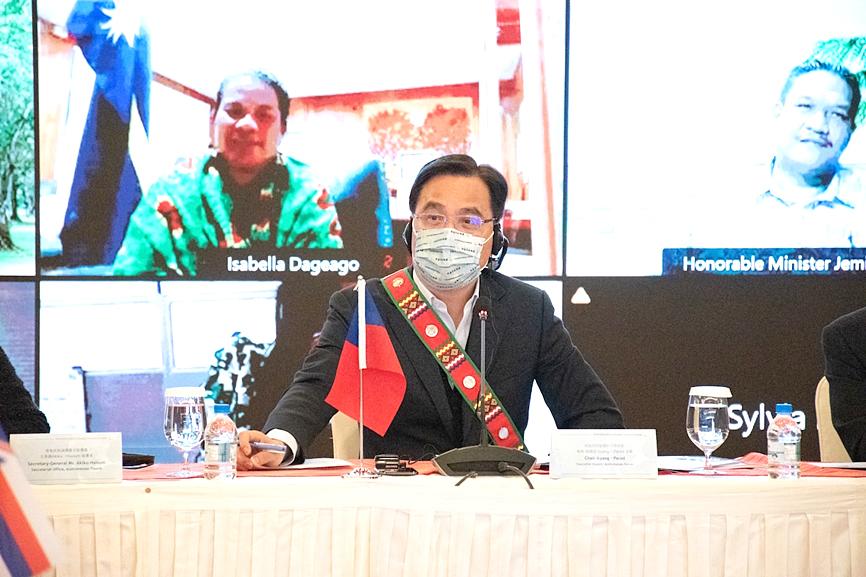The annual Austronesian Forum was held in Taipei on Tuesday, focusing on traditional social and leadership structures in Austronesian cultures.
Originally scheduled to be held in the Marshall Islands, the forum was moved to the Grand Hotel in Taipei due to COVID-19 considerations, and is to be convened in the Marshall Islands next year.
It was the first forum to be attended by representatives from Hawaii, who joined representatives from 14 other regions.

Photo courtesy of the Council of Indigenous Peoples via CNA
Council of Indigenous Peoples Minister Icyang Parod, who chairs the forum, opened discussion of this year’s theme by sharing the traditional leadership structures within his own Amis culture.
Amis society has a “very strict age-class system,” wherein rigorous training and labor division apply to different age groups, he said in his opening remarks.
Training of the younger classes by the older classes allows the spirit of responsibility, discipline and labor division to be passed down through the generations, he said.
“However, just like many of the Austronesian peoples, the traditional leadership systems of Taiwan’s indigenous peoples have somewhat changed over time,” he added.
Icyang later chaired the forum’s Executive Council meeting, during which the attendees affirmed the past year’s achievements.
It was the second year of the forum’s six-year plan focusing on language and cultural exchange, regional industrial development, research, human resources development and basic administrative affairs.
Despite COVID-19, each part of the forum’s plan achieved results, which secretary-general Akiku Haisum shared with the council.
These included forums on Aboriginal languages, an international youth employment program, the Indigenous Peoples Economic Development Forum and a Web portal for Austronesian studies.
After a false start in 2008, the Austronesian Forum in its current form was convened in 2018 as a permanent platform for cooperation among Austronesian peoples.
Members include Taiwan, Kiribati, the Marshall Islands, the Solomon Islands, Nauru, Tuvalu, Palau, New Zealand, the Philippines, Malaysia, Indonesia, Papua New Guinea, Guam and Hawaii.

The brilliant blue waters, thick foliage and bucolic atmosphere on this seemingly idyllic archipelago deep in the Pacific Ocean belie the key role it now plays in a titanic geopolitical struggle. Palau is again on the front line as China, and the US and its allies prepare their forces in an intensifying contest for control over the Asia-Pacific region. The democratic nation of just 17,000 people hosts US-controlled airstrips and soon-to-be-completed radar installations that the US military describes as “critical” to monitoring vast swathes of water and airspace. It is also a key piece of the second island chain, a string of

A magnitude 5.9 earthquake that struck about 33km off the coast of Hualien City was the "main shock" in a series of quakes in the area, with aftershocks expected over the next three days, the Central Weather Administration (CWA) said yesterday. Prior to the magnitude 5.9 quake shaking most of Taiwan at 6:53pm yesterday, six other earthquakes stronger than a magnitude of 4, starting with a magnitude 5.5 quake at 6:09pm, occurred in the area. CWA Seismological Center Director Wu Chien-fu (吳健富) confirmed that the quakes were all part of the same series and that the magnitude 5.5 temblor was

Taiwan will now have four additional national holidays after the Legislative Yuan passed an amendment today, which also made Labor Day a national holiday for all sectors. The Chinese Nationalist Party (KMT) and Taiwan People’s Party (TPP) used their majority in the Legislative Yuan to pass the amendment to the Act on Implementing Memorial Days and State Holidays (紀念日及節日實施辦法), which the parties jointly proposed, in its third and final reading today. The legislature passed the bill to amend the act, which is currently enforced administratively, raising it to the legal level. The new legislation recognizes Confucius’ birthday on Sept. 28, the

The Central Weather Administration has issued a heat alert for southeastern Taiwan, warning of temperatures as high as 36°C today, while alerting some coastal areas of strong winds later in the day. Kaohsiung’s Neimen District (內門) and Pingtung County’s Neipu Township (內埔) are under an orange heat alert, which warns of temperatures as high as 36°C for three consecutive days, the CWA said, citing southwest winds. The heat would also extend to Tainan’s Nansi (楠西) and Yujing (玉井) districts, as well as Pingtung’s Gaoshu (高樹), Yanpu (鹽埔) and Majia (瑪家) townships, it said, forecasting highs of up to 36°C in those areas